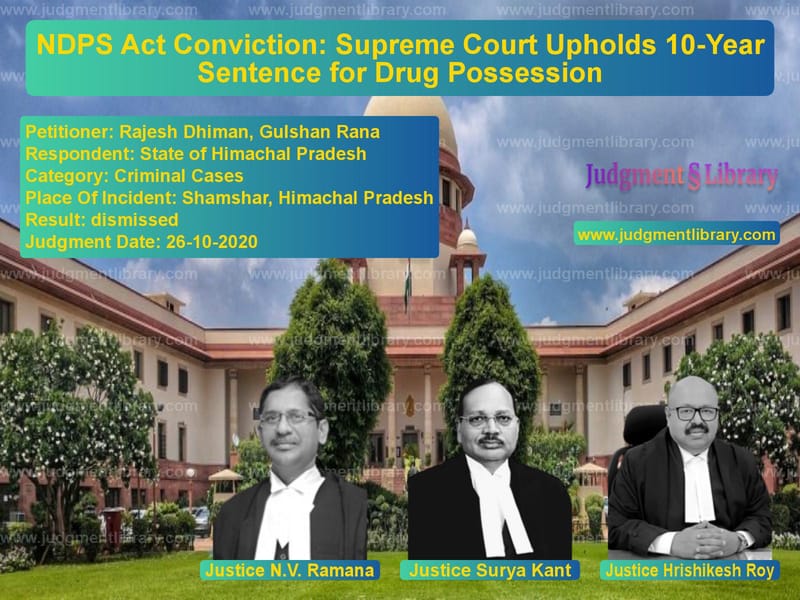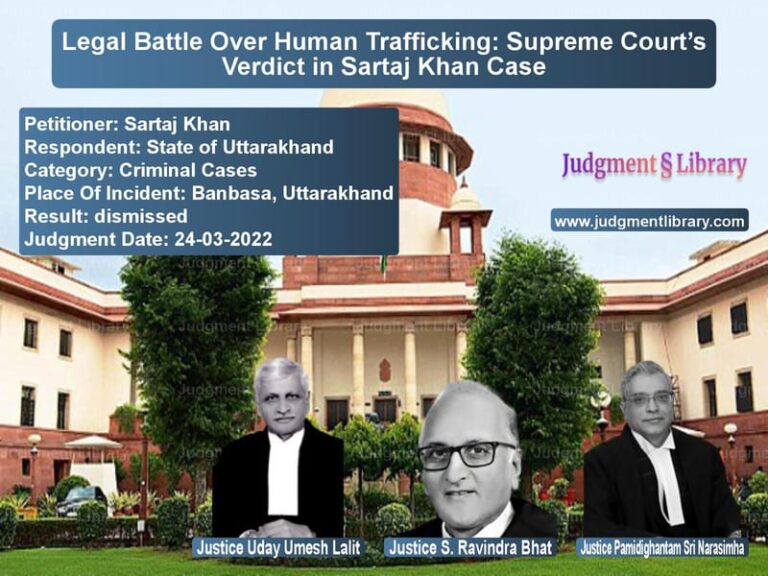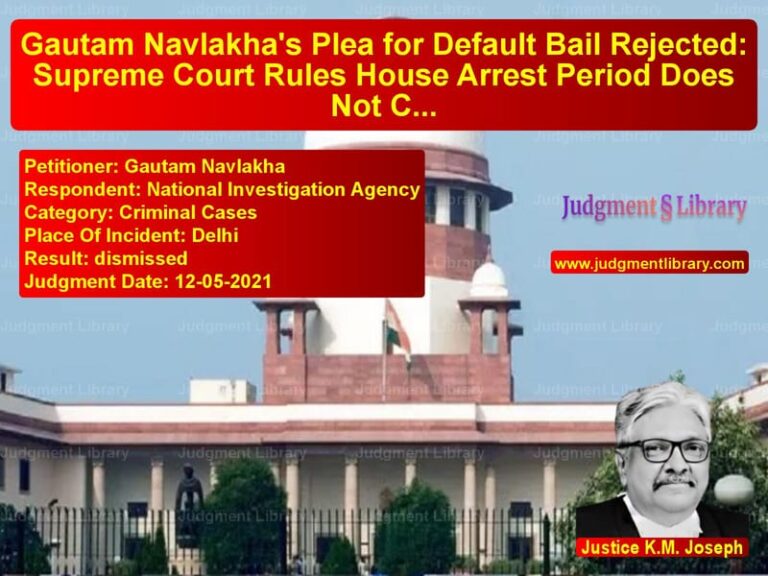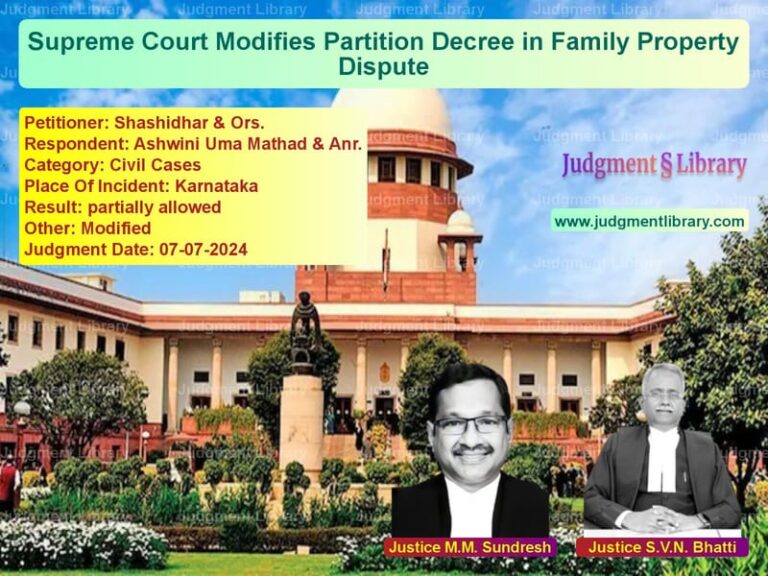NDPS Act Conviction: Supreme Court Upholds 10-Year Sentence for Drug Possession
The Supreme Court recently ruled on a significant case involving the Narcotic Drugs and Psychotropic Substances (NDPS) Act, 1985. The case centered around two appellants, Rajesh Dhiman and Gulshan Rana, who were initially acquitted by the trial court but later convicted by the High Court of Himachal Pradesh. The Supreme Court upheld the High Court’s decision, reinforcing the strict provisions of the NDPS Act.
The appellants were sentenced to ten years of rigorous imprisonment along with a fine of Rs. 1,00,000 each for possession of a commercial quantity of charas. The ruling once again underscored the stringent requirements under the NDPS Act and the limited scope for leniency in drug-related offenses. Let us delve into the details of the case and the arguments presented by both parties.
Background of the Case
On January 9, 2002, at approximately 1:00 PM, a police team led by ASI Purushottam Dutt, along with several other police personnel, was conducting traffic checks at Shamshar, Himachal Pradesh. During the operation, they stopped a motorcycle without a number plate. The vehicle was being driven by Gulshan Rana, while Rajesh Dhiman was riding pillion, carrying a backpack. Upon demanding vehicle documents, the officers noticed suspicious behavior from the riders, prompting them to conduct a search.
The search led to the discovery of polythene bags inside the backpack, containing a total of 3.1 kg of charas. Following due legal procedures, the police separated samples for forensic examination, sealed the remaining contraband, and arrested the appellants. The contraband was later deposited at the police station by an independent witness, Karam Chand.
Trial Court Proceedings
The case was initially tried before a Special Judge, who acquitted the appellants on December 28, 2002. The trial court found multiple procedural lapses in the investigation, particularly the absence of independent witnesses. The primary basis for the acquittal was:
- Lack of independent corroboration, as no neutral witness was present at the scene.
- Failure to follow statutory provisions under Section 100(4) of the CrPC, which mandates the presence of independent witnesses.
- The complainant was also the investigating officer, leading to doubts about impartiality.
The trial court opined that since two versions of the incident had emerged, the version favoring the accused should be preferred, following the principle of “innocent until proven guilty.”
High Court’s Reversal of the Acquittal
The State of Himachal Pradesh appealed against the acquittal before the High Court. The High Court reversed the trial court’s decision and convicted the appellants under Section 20 of the NDPS Act, imposing a sentence of ten years of rigorous imprisonment and a fine of Rs. 1,00,000 each.
The High Court ruled that non-examination of independent witnesses did not automatically weaken the prosecution’s case. It highlighted that the police had attempted to secure independent witnesses but had failed due to non-cooperation from locals. The High Court also noted that the testimonies of the police officers were consistent and credible, satisfying the requirement of proof beyond a reasonable doubt.
Arguments of the Parties
Petitioners’ Arguments
- The High Court should not have reversed the trial court’s acquittal, as two conflicting versions of the incident were present.
- The complainant and the investigating officer were the same person, creating bias.
- The lack of independent witnesses raised doubts about the authenticity of the case.
- Section 50 of the NDPS Act was violated as the appellants were not given the option of being searched in the presence of a Magistrate or Gazetted Officer.
Respondent’s Arguments
- The prosecution relied on the Supreme Court ruling in Mukesh Singh v. State (Narcotic Branch of Delhi), which held that a complainant can also be an investigating officer.
- The quantity of charas seized was substantial, qualifying as a commercial quantity, leaving no room for leniency.
- The police officers’ testimonies were consistent, and there was no reason to suspect bias.
- The appellants’ defense—that an unknown third person was the actual carrier of the drugs—was improbable and lacked evidence.
Supreme Court’s Verdict
The Supreme Court upheld the High Court’s judgment, rejecting the appellants’ arguments. It ruled that mere procedural lapses or the absence of independent witnesses do not automatically vitiate a trial. The Court also clarified that in NDPS cases, independent witnesses are desirable but not mandatory, especially when the police make an effort to secure them.
Regarding the complainant also acting as the investigating officer, the Supreme Court referred to the Constitution Bench ruling in Mukesh Singh, which settled that such a scenario does not automatically lead to acquittal unless actual bias is proven. The Court found that no such bias was evident in this case.
Conclusion
By affirming the conviction, the Supreme Court reinforced the stringent provisions of the NDPS Act. The appellants were directed to be taken into custody to serve their remaining sentence. The ruling serves as a stern warning against drug-related offenses and highlights the judicial system’s commitment to tackling narcotics crimes in India.
Petitioner Name: Rajesh Dhiman, Gulshan Rana.Respondent Name: State of Himachal Pradesh.Judgment By: Justice N.V. Ramana, Justice Surya Kant, Justice Hrishikesh Roy.Place Of Incident: Shamshar, Himachal Pradesh.Judgment Date: 26-10-2020.
Don’t miss out on the full details! Download the complete judgment in PDF format below and gain valuable insights instantly!
Download Judgment: Rajesh Dhiman, Gulsh vs State of Himachal Pr Supreme Court of India Judgment Dated 26-10-2020.pdf
Direct Downlaod Judgment: Direct downlaod this Judgment
See all petitions in Drug Possession Cases
See all petitions in Bail and Anticipatory Bail
See all petitions in Fraud and Forgery
See all petitions in Custodial Deaths and Police Misconduct
See all petitions in Judgment by N.V. Ramana
See all petitions in Judgment by Surya Kant
See all petitions in Judgment by Hrishikesh Roy
See all petitions in dismissed
See all petitions in supreme court of India judgments October 2020
See all petitions in 2020 judgments
See all posts in Criminal Cases Category
See all allowed petitions in Criminal Cases Category
See all Dismissed petitions in Criminal Cases Category
See all partially allowed petitions in Criminal Cases Category







